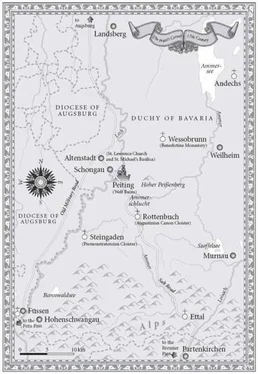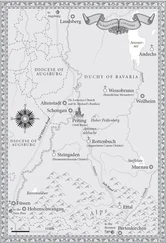Oliver Potzsch - The Hangman’s Daughter
Здесь есть возможность читать онлайн «Oliver Potzsch - The Hangman’s Daughter» весь текст электронной книги совершенно бесплатно (целиком полную версию без сокращений). В некоторых случаях можно слушать аудио, скачать через торрент в формате fb2 и присутствует краткое содержание. Жанр: Исторический детектив, на английском языке. Описание произведения, (предисловие) а так же отзывы посетителей доступны на портале библиотеки ЛибКат.
- Название:The Hangman’s Daughter
- Автор:
- Жанр:
- Год:неизвестен
- ISBN:нет данных
- Рейтинг книги:5 / 5. Голосов: 1
-
Избранное:Добавить в избранное
- Отзывы:
-
Ваша оценка:
- 100
- 1
- 2
- 3
- 4
- 5
The Hangman’s Daughter: краткое содержание, описание и аннотация
Предлагаем к чтению аннотацию, описание, краткое содержание или предисловие (зависит от того, что написал сам автор книги «The Hangman’s Daughter»). Если вы не нашли необходимую информацию о книге — напишите в комментариях, мы постараемся отыскать её.
The Hangman’s Daughter — читать онлайн бесплатно полную книгу (весь текст) целиком
Ниже представлен текст книги, разбитый по страницам. Система сохранения места последней прочитанной страницы, позволяет с удобством читать онлайн бесплатно книгу «The Hangman’s Daughter», без необходимости каждый раз заново искать на чём Вы остановились. Поставьте закладку, и сможете в любой момент перейти на страницу, на которой закончили чтение.
Интервал:
Закладка:
“Save…the town?” asked Matthias Augustin, astonished.
“Well,” Simon added, “if you don’t present the Landgrave with a good story, he’ll hunt down more witches and keep on until half the women in Schongau are burned at the stake. Remember the witch trials in your childhood, when dozens of women were burned. The council will support you and swallow a few small lies if you see to it that the past does not repeat itself. You alone have enough influence to persuade the aldermen and the Landgrave. Use it! I’m sure you know all the mean little secrets that each of them has, which you can use to persuade them if necessary.”
Matthias Augustin shook his head.
“Your plan won’t work. Too much has happened…”
“Think of the money,” the hangman interrupted him. “The money and your reputation. If we tell the people out there what kind of villains you and your son are, probably nobody will believe us. We ourselves know that we lack proof. But who knows? Somewhere something will stick…I know the people. They gossip, and even the fine people come to me from time to time for a love potion or a salve for warts, and so people start to talk…”
“Stop, just stop it!” Matthias Augustin cried. “You have persuaded me. I will do my utmost. But I can’t promise you anything.”
“We can’t promise anything either,” said the hangman, deftly sweeping up the money from the table into his big coat. The old man tried to protest, but a glance from the hangman made him fall silent.
“Come to my house in two days, after the big council meeting,” said Jakob Kuisl. “I’m quite sure your son will be needing a jar of arnica.” He looked down at Georg Augustin almost sympathetically as he lay huddled upon the floor, still unconscious. A small pool of dried blood surrounded his black locks. Then the hangman turned to the father again.
“Perhaps I can also find an elixir in my closet that will reduce your pain. Believe me, we shabby barbers and army surgeons know one or two mysteries that the university doctors still haven’t heard of.”
He went to the door and waved his goodbye with the bag. “If the council gets it right, this bag will change its owner. If not, I’ll throw it in the Lech. It’s up to you.”
Simon followed him out. Before he shut the door, he could hear the old man groaning once more. The cramps had started again.
The council meeting two days later was one of the strangest ever to take place in Schongau. Matthias Augustin had used the whole of the previous day to put the squeeze on individual members of the inner council. He had found something against every one of them. With threats, flattery, and persuasion he was able to bring every one of them over to his side. When he finally convinced the court clerk Johann Lechner, there was nothing more in the way of the final plan.
When the Landgrave appeared at the council meeting in the morning, he was confronted by a unanimous group of enlightened burghers who considered the slightest suspicion of witchcraft as belonging in the realm of legend. The investigations conducted by the council had determined without doubt that the witches’ signs were nothing but a children’s game, the fire at the Stadel was an act of revenge by the depraved Augsburg thugs, and the murdered children the victims of shady elements hiding in the forests around Schongau. All of it no doubt very sad, but no cause for mass hysteria.
In addition, by a stroke of luck, the former mercenary soldier and robber Christoph Holzapfel was arrested by the Landgrave’s men on the morning of the third of May. Magdalena, the hangman’s daughter, identified him immediately as her abductor, and by the evening the wicked soldier had confessed, in the keep, to having murdered three little children from Schongau out of pure malice.
Remarkably, no torture was necessary to obtain this confession. But the hangman must have shown him the instruments during the short time that he was alone with the abductor of his daughter. In any case, the murderer was afterward prepared to make a written confession, which he signed with his left hand. The right hand hung down like a damp red rag and seemed to be only held together by skin and sinew.
The Landgrave made a few lame attempts to have the Stechlin woman tried for witchcraft after all. But as she had not confessed up to then, he would have had to apply to Munich for permission to continue the torture. The four burgomasters and the court clerk made it clear to him that he could not rely on their support.
The final touch was supplied by old Matthias Augustin, who described in lively detail before the whole council the horrors of the last great witchcraft trial of 1589. Even the Landgrave did not want to do anything to bring that about again.
And so at noon on May 4, 1659, the entourage of the Landgrave Count Wolf Dietrich von Sandizell set out again for his estate at Thierhaupten, from there to direct the destinies of Schongau at a distance. As the soldiers in their shining breast-plates rode through the town gates, the burghers waved a long farewell to their lord. Noisy children and barking dogs accompanied the carriage as far as Altenstadt. The burghers all agreed it had been nice to see such important people close up. It was even nicer to see them ride away.
The hangman went to the keep and had the door unlocked by the bailiffs. Martha Stechlin lay sleeping among damp straw and her own foul-smelling excrement. Her breathing was regular, and the swelling on her forehead had gone down. Jakob Kuisl bent down to her and patted her cheek. A smile came to his face. He remembered how this woman had stood by his side at the birth of his children-the blood, the screaming, and the tears. Strange, he thought. People fight with tooth and nail when they come into the world, and when they have to go they fight too.
Martha Stechlin opened her eyes. It took some time before she found her way out of her dreams back into the prison.
“What is it, Kuisl?” she asked, not yet fully conscious. “Will it go on? Have you come to hurt me again?”
The hangman smiled and shook his head.
“No, Martha. We’re going home.”
“Home?”
The midwife sat up. She blinked, as if she wanted to see if she wasn’t still dreaming. Jakob Kuisl nodded.
“Home. Magdalena has been tidying up a bit at your house, and young Schreevogl has contributed heaps of money. For a new bed, pots and pans, whatever you need. It’ll do for the beginning. Come, I’ll help you up.”
“But why?”
“Don’t ask now. Go home. I’ll tell you about it later.”
He grasped her under the arms and pulled her to her feet, which were still swollen. Martha Stechlin limped along at his side toward the open door. Sunlight flowed in from outside. It was the morning of May fifth, a warm day. The birds were twittering, and from the town they could hear the cries of the maids and housewives haggling in the marketplace. From the fields the scents of summer and flowers wafted over to them, and if you closed your eyes you could even hear the murmuring of the Lech. The midwife stood in the doorway and let the sun shine on her face.
“Home,” she whispered.
Jakob Kuisl wanted to support her by taking her under her arms, but she shook her head and pulled away. Alone she limped along the alley toward her little house. At the next bend in the road, she disappeared.
“The hangman, a friend of humanity-who would have thought it?”
The voice came from another direction. Jakob Kuisl looked around and saw the court clerk strolling toward him. He was wearing his dress coat, the brim of his hat was turned up jauntily, and in his right hand he held a walking stick. The hangman nodded a wordless greeting, then he turned to go on.
Читать дальшеИнтервал:
Закладка:
Похожие книги на «The Hangman’s Daughter»
Представляем Вашему вниманию похожие книги на «The Hangman’s Daughter» списком для выбора. Мы отобрали схожую по названию и смыслу литературу в надежде предоставить читателям больше вариантов отыскать новые, интересные, ещё непрочитанные произведения.
Обсуждение, отзывы о книге «The Hangman’s Daughter» и просто собственные мнения читателей. Оставьте ваши комментарии, напишите, что Вы думаете о произведении, его смысле или главных героях. Укажите что конкретно понравилось, а что нет, и почему Вы так считаете.











